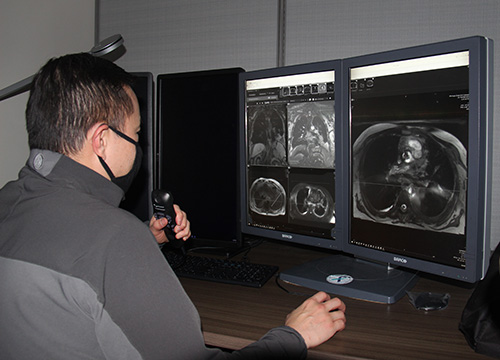Fellows will receive training in the interpretation of other imaging modalities of the body including:
- CT of the chest, abdomen, and pelvis

- CT Colonography
- PET-CT
- Ultrasound and ultrasound-guided procedures
- Fluoroscopy
- Plain film interpretation
Fellows will also receive several didactic lectures in abdominal imaging, vascular and interventional radiology, and PET/CT. Medical Imaging Grand Rounds and body division case review add to the educational experience.
At the end of the one-year fellowship, the fellow should be able to demonstrate the following skills and competencies:
- Interpreting cross-sectional US, CT, and MR imaging of the body
- Performing and interpreting fluoroscopic procedures
- Performing ultrasound-guided procedures including thoracentesis, paracentesis, and biopsies
- Comprehensive knowledge of the physics of ultrasound, CT, and MR imaging and an ability to apply this knowledge for image optimization and for quality assurance issues
- Patient care in the areas of consultation particularly in multidisciplinary conferences, patient safety, and diagnostic and therapeutic procedures
- Proficiency in protocoling exams
Throughout the year, fellows frequently interact with other medical services and are actively involved in several multidisciplinary conferences which include hepatobiliary, colorectal, urology, gynecology, and nephrology. Frequently, these discussions focus on the newest techniques and approaches to treatment.
Abdominal Radiology fellows at the University of Arizona are also given the opportunity to participate in research and technology development with at least one academic day per week. All trainees are required to participate in at least one scholarly project. Fellows can participate in one or several of the following project types: laboratory research, clinical research, image interpretation, imaging techniques, or practice management issues. Within the department, the fellows will be offered opportunities to participate in on-going basic and translational research. Within the field of MR imaging of the body, the abdominal division is actively engaged in several translational research projects. Such examples include quantitative measuring of hepatic fibrosis, spectroscopic measurement of iron and fat composition within the liver, dynamic pelvic imaging to assess for pelvic floor instability, and dynamic MR imaging of the lungs.
Clinical research meetings for fellows and attendings are held monthly. Fellows are encouraged to author publications and to present at meetings. All publications and presentations will be written with faculty guidance. If a fellow has a presentation accepted for a national conference, department funding is often available.
The Arizona Health Sciences Library (AHSL) of the University of Arizona supports the students, faculty, researchers and clinicians in the College of Medicine and other colleges. AHSL enables electronic access to vast stores of biomedical literature (around 10,000 serials) and participates as instructors in the curriculum of the colleges, works with researchers and clinicians on projects to improve access to essential information, and provides comfortable space for small group collaborations and quiet studying in a collegial atmosphere. Evidence-based medicine tools include EBM Search (a locally developed federated search), Cochrane, ACP Pier, BMJ Clinical Evidence, and Clinical Practice Guidelines. StatRef is a collection of over 90 electronic textbooks. Countless full-text journals are also accessible through the campus library catalog 24 hours a day.
Learn more about research opportunities in the Department of Medical Imaging.
Please note: the Fellow Candidate must be eligible to obtain an Arizona Medical License prior to the start of the program. To be eligible for acceptance, applicants must possess an MD or DO degree and have satisfactorily completed a diagnostic radiology residency training program accredited by the ACGME or the Royal College of Physicians and Surgeons of Canada (RCPSC). For applicants that originate from a non-ACGME-accredited residency, please note the following requirements and items that will need to accompany your application as outlined by the ACGME under Section III.
Candidates should send the following documents to Ina Rios at imrios@arizona.edu
- Curriculum Vitae
- Personal Statement
- University of Arizona, Department of Medical Imaging, Fellowship Application
- Medical School Transcripts or Dean’s Letter
- 3 letters of recommendation
- USMLE Scores (Steps I, II, IICS, III)
- Photo
- Visa Status, if applicable
- ECFMG Certificate, if applicable


